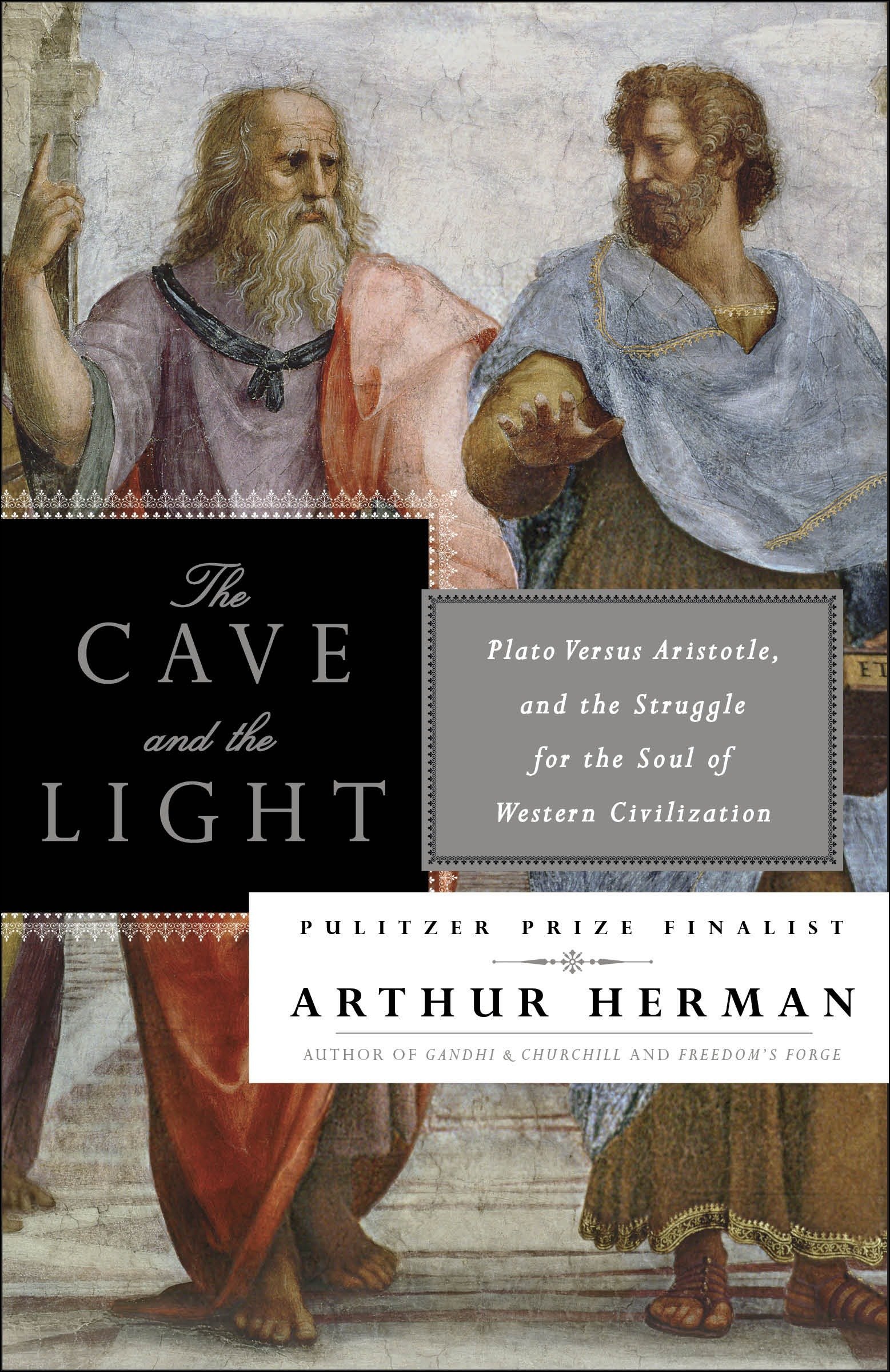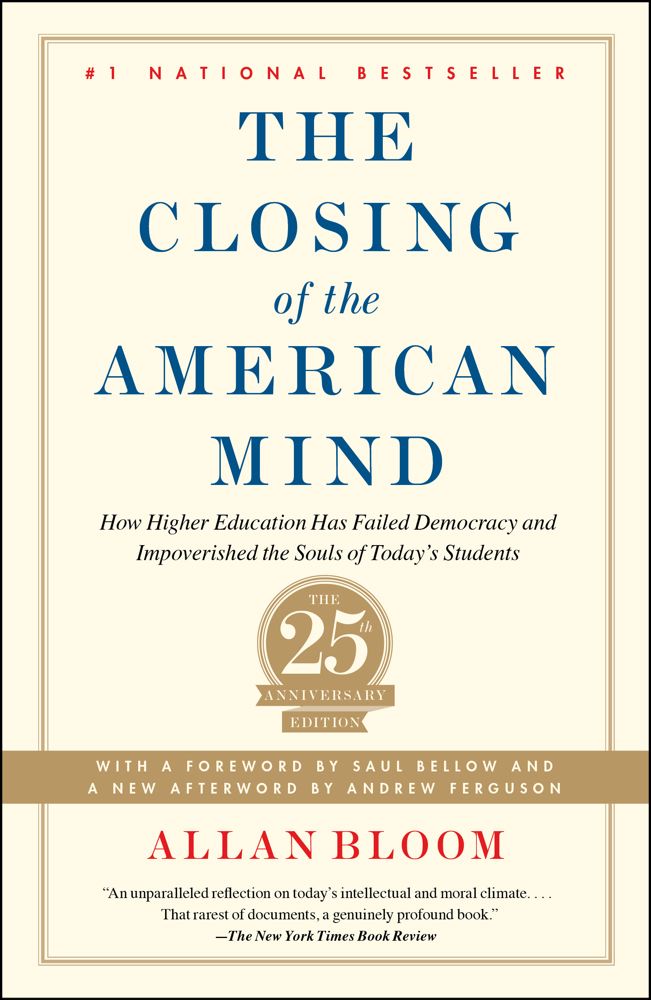Libertarianism the Prime Mover
Tuesday, December 29, 2020 at 2:33am

In order to fully appreciate my position on The Cave and the Light, it is necessary for me to go into a bit of detail on my experience with The Closing of the American Mind, a book I also found problematic, but which I believed was redeemed by virtue of being primarily about a love and appreciation of classical literature. Written during the so-called academic “canon wars” of the 1980’s, the book makes the case that there are certain authors, such as Plato and Aristotle (among others) who cannot be removed from the canon, at least the one used for academic instruction, without considerable damage to the intellectual well-being of society. It seems to me that critiques of the book focus too much of their attention on its first third, a droll set of chapters designed to push cultural conservatives’ buttons, and far too little on the latter two-thirds, which consist of an impassioned ideological defense of the intellectual, moral, and ethical content of classical literature. Those sections prompted this reader to say: “That’s an interesting position. Let me go see for myself if that’s true.” The result was an eighteen month binge of Plato, Aristotle, Homer, Herodotus, Aeschylus, Sophocles, Euripides, and (my favorite of the playwrights) Aristophanes. I came to the conclusion that Bloom’s position was more or less correct, even if his argumentation included an unfortunate partisan dog whistle. 
The Cave and the Light begins with no apparent ideological stance. It starts simply with a rendition of the lives of both Plato and Aristotle and continues chronologically through the major thinkers and writers onward. The first five hundred pages are much the same stylistically and thematically. A major thinker is introduced by way of a third-person narrative vignette from that figure’s life, the text covers their major thoughts and achievements, then ties them into the broader societal and cultural changes that lead to the next figure.
The first hint I got that something was perhaps amiss was when, after a balanced and routine review of Aristotle’s scientific, religious, and ethical doctrines, Herman moves on to politics and drops this bomb: “Aristotle believed that the goal of political institutions was man’s improvement rather than his perfection. He believed the way to do this was by encouraging each individual to realize his potential, rather than force him to submit to a collective order.”
I am not sure how a person comes away from Aristotle’s Politics believing it to be about the superiority of individualism over collectivism. To call this a misrepresentation of Aristotle is to do a disservice to those who intend to misrepresent works. What Herman is doing here strikes me rather like trying to argue that Alice in Wonderland is about colonialism, or that Spiderman is about gender politics. It is a wild fiction without a shred of any hook or meager thread in the text of Aristotle’s Politics.
Although this oddity appears within the first one hundred pages of The Cave and the Light, Herman quickly moves on to discuss other figures, and although I marked this section out, I saw very little else that distressed me in Herman’s interpretations for some time. The first yellow light was his bizarrely hostile depiction of the life of Peter Abelard. Herman’s derision and dislike practically oozed off the page.
Things do not really get going though until the modern era. Herman reveals new levels of disparagement for Nietzsche, Hegel, and Marx. And after them, we reach the book’s truly bizarre hundred-page finale, in which it is revealed that the Aristotelian/Platonic tension that Herman has been dramatizing throughout the book has in fact been a kind of ideological war, one which has resulted in modern physics, modern medicine, and free market capitalism from Aristotle, and Hitler’s fascism, Marx’s communism, and modern American progressivism (to Herman’s mind a kind of “fascism lite”) from Plato. Yes, you did not misread that. Herman believes that Platonic philosophy leads to populist uprisings and genocide.
If only it stopped there. As if this claim wasn’t wacky enough, Herman also claims that: the 1910’s and 1920’s were pinnacles not of market freedom but of governments manipulating markets and oppressing private business owners; private businesses rather than the United States government were responsible for managing the country’s armament process during World War II; all problems of the modern world are caused by forms of Platonic absolutism squelching out the individual autonomy Aristotle supposedly said we were all supposed to have.
One of the ways in which Aristotle actually differed from his teacher Plato, was in his conception of God. Plato saw God as a separate layer of reality, a realm of “forms,” a form being the perfect realization of some element of the world—the perfect tree, the perfect deer, the perfect house, etc. Aristotle called his conception of God “the Prime Mover.” For Aristotle, God was not separate from our reality on some other plane of existence, but a part of it. Aristotle saw all of reality as substances acting upon one another, changing and influencing each other. He traced all that action and change back to a “Prime Mover,” that thing at the beginning of time that “kicked off” the process of action and reaction and was itself not moved or changed by anything else in the universe. Herman thinks of himself as championing the ultimate conception of the Prime Mover, to his mind, free market capitalism, but I would argue that his ideology has a much more a Platonic bent (to use his own corrupted meaning of the adjective) than he would like to admit.
Free market libertarianism is a thoroughly problematic ideology, most notably in 2020 as the coronavirus pandemic propels the already out-of-control forces of socioeconomic disparity into overdrive. Herman had his book published seven years earlier, in 2013, but those forces were easily recognizable then. And yet, Herman champions his ideology to the end, claiming that the way forward is Aristotle’s supposedly individualistic free market and that supposedly Platonic progressivism is the path to authoritarian oppression.
I came away from my experience with The Closing of the American Mind excited. I was about to start on a new adventure where I would discover for myself the merit or lack thereof in a body of work that at least one other person in the world had found so compelling that it has caused him to write an impassioned plea for its preservation within academic institutions. I am so glad that I did not read The Cave and the Light first. I fear I may have instead drawn the conclusion that studying classical literature would be a good way to end up disassociated from reality.









